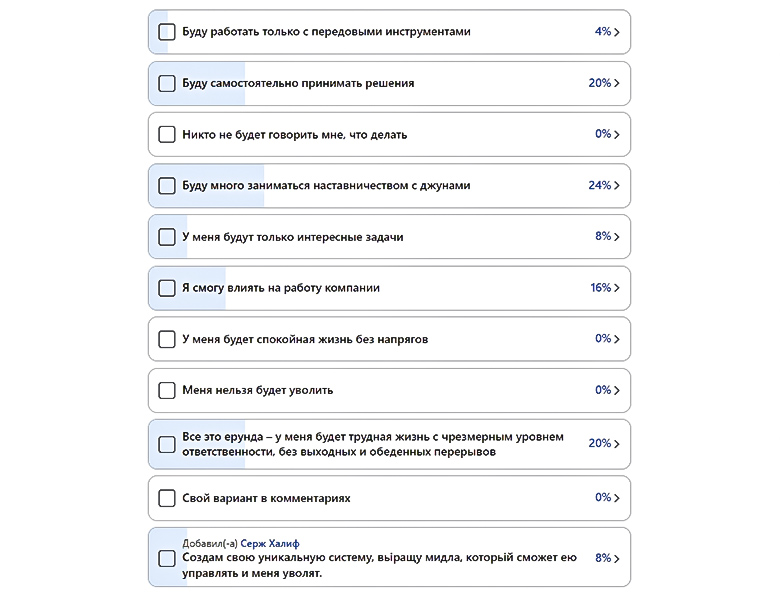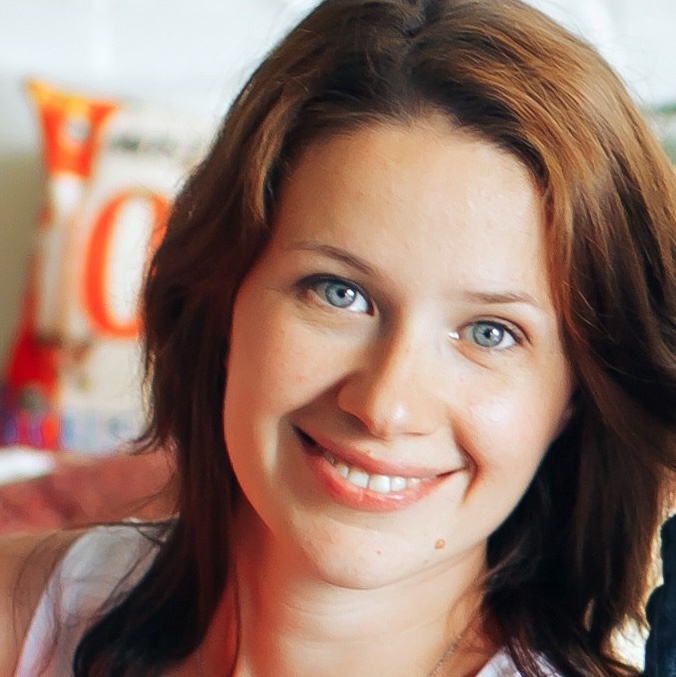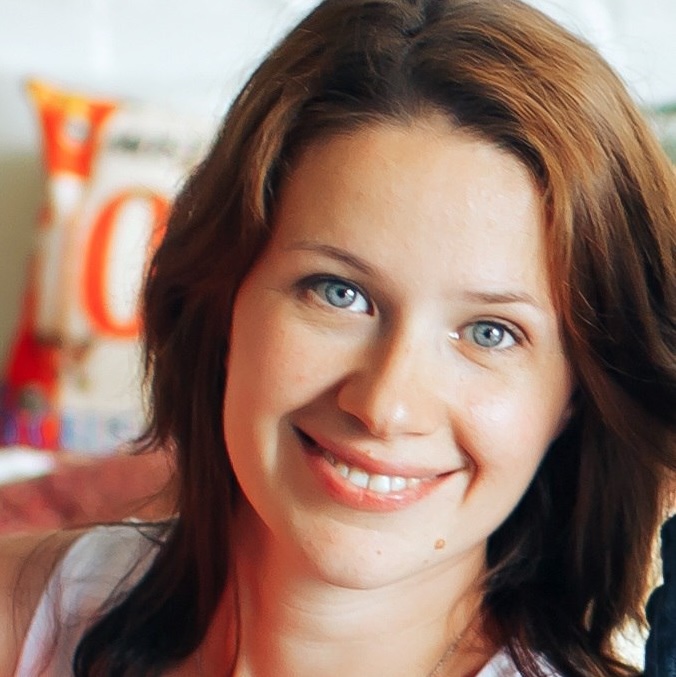Myths about lords that juniors (don’t) believe in
At the beginning of a career, many people think that they just need to put in a little effort, climb a couple of steps up the career ladder, and a quiet life will begin. We conducted a short survey of juniors on social networks and collected different opinions in the IT communities to find out how often juniors believe in miracles and whether they will be disappointed when they reach the rank of seniors.
The most dangerous misconceptions of Junes about seniors
We were inspired to think about this topic article Vadim Kravchenko, co-founder and CTO of a Swiss digital agency. He shared his thoughts on how the Junes imagine their lords and how far reality is from these idealistic ideas.
Frankly, this gap between expectations and reality makes me a little sad.
Senor is irreplaceable
❌ Expectation: when I become a senior, they won’t be able to fire me.
✅ Reality: “I hope I don’t get fired.”
Indeed, seniors can count on a share of stability thanks to their experience and expertise. But this does not mean that they are guaranteed lifelong employment. Companies face various challenges – economic downturn, change of strategy, mergers and acquisitions. All this sometimes leads to restructuring and, sadly, to the dismissal of employees at any level. You have to study in IT all your life. If a senior continues to adapt to change, it will almost certainly protect his career from unforeseen circumstances.
No more boring tasks
❌ Expectation: the senior does not do boring tasks.
✅ Reality: endless meetings, documentation, code reviews and debugging of outdated systems.
The senior is required to do a portion of everyday, but very important tasks: endless meetings, detailed documentation, code review and debugging of outdated systems. The life of a senior is full of contradictions: on the one hand, he often has to solve boring problems. On the other hand, it is the tedious tasks that can bring the most benefit: documenting development processes, coordinating the work of employees, or monitoring that the team is growing under wise leadership.
Seniors know the answers to all questions
❌ Expectation: the sir can eliminate any bugs in just a couple of minutes.
✅ Reality: the more the senior learns, the more clearly he understands how much he still doesn’t know.
In fact, the level of expertise is not measured by acquired knowledge, but by the ability to work under conditions of uncertainty, ask questions that help get to the bottom of the matter, and know where to look for a solution once you have grasped the essence of the matter.
We live in a world where new technologies and algorithms appear every day, so it is simply impossible to know everything. Technology is a vast, ever-expanding universe. And the job of a senior is not about knowing everything, but about the ability to competently solve assigned tasks.
A senior can truly influence the work
❌ Expectation: the senior will be able to radically change the work of the company.
✅ Reality: changes cannot be implemented without management permission and a sufficient budget.
When you’re young, it seems like you’re a hammer and everything around you is nails. Junes often throw out suggestions left and right because they want to improve the processes they work with. Over the years, experience accumulates that helps you understand that not everything should be perceived as a nail, and a hammer is not the only useful tool in life. As professionalism grows, it becomes clear that change takes time. The idea not only needs to be implemented on a technical level, but also needs to be aligned with the company’s goals, budget limits and risk management.
The senor has no stress in life
❌ Expectation: the senior has the perfect balance of work and rest.
✅ Reality: balancing deadlines, mentoring and personal life is like juggling knives. Sometimes you do drop one of them.
The senior's responsibilities are not limited to purely technical tasks: he is involved in mentoring, strategic planning and project operations. The senior actively participates in the work of the company. Unlike juniors, seniors are concerned whether this or that task will block the work of ten more employees. Therefore, they often have to stay late in the evenings and work on weekends, especially when deadlines are pressing or unforeseen circumstances arise. They have to navigate between professional responsibilities and personal life, because independence in work goes hand in hand with responsibility and achieving results on several fronts.
Senior works with advanced technologies
❌ Expectation: the senior works with the latest technologies.
✅ Reality: a decent portion of the time you have to fix bugs in legacy code.
The responsibilities of a senior often include maintenance and modification of old systems. These systems carry the burden of years of business logic, customer data, and workflow analytics. A significant part of the senior’s job is to understand these systems, bring them to meet current requirements, and not break anything himself.
The lord decides what to do
❌ Expectation: The senior manages large projects, influences the state of affairs in the company and tells others what to do.
✅ Reality: “How I miss the times when I was told what to do.”
The senior has a large amount of meta-work: planning, thinking, decision-making. But this does not eliminate the manual work: fixing old code, checking code for a new project, preparing graphics to explain the security of the platform to management.
The higher the position, the fewer people give instructions to the specialist. But the more the others expect the lord to know what to do. When you manage large projects, you experience the fear of failure and bear the burden of responsibility for the decisions you make. And it happens that seniors miss the times when they could just do programming without thinking about large-scale issues.
What's in reality: cautious optimism
We wondered: can this gap in expectations be considered a common problem, or is realism still in charge, and juniors and seniors are not so much mistaken about each other? To do this, we conducted a small survey of juniors on social networks and collected different opinions in the IT communities. Spoiler: not everything is so hopeless.
We asked the juniors how they imagine the work of seniors. To do this, we sent a small survey to the group of programmers, and this is what we got as a result:

The answers turned out to be quite realistic: none of the respondents expect that when he climbs up the career ladder, for some reason he will begin a quiet life, where he is not threatened with dismissal and no one tells him what to do. Most juniors understand that they will have to make their own decisions and do a lot of mentoring with newcomers. 20% of survey participants are not at all optimistic about the promotion: they are mentally preparing for a difficult life with overtime and a high level of responsibility.

Grigory Sokolov
Head of AI, senior data scientist and product owner of the Baum AI applied AI platform
I have always understood that the higher the position, the higher the responsibility. The higher the level, the higher the responsibility, the greater the involvement in the task and the greater the focus on soft skills.

Elena Ponomareva
Beginner web designer
When I become a senior, I am going to take on even more responsibility, share my experience and inspire my colleagues. Soft skills occupy an important place for me. As a future senior, I am going to listen to my colleagues and organize my work as comfortably as possible.
A certain consensus about the importance of soft skills and the level of responsibility of senior developers is striking. Many users agree that a June usually requires guidance. For many new developers, it is important that a senior employee does not completely do the work for them, but simply tells them where to go. The senior must be able to guide his employees, correctly assess risks and deadlines, and convey all this to management, and sometimes to clients.

Elena Ponomareva
Beginner web designer
For me, a senior friend in web design is a person who, first of all, is not ashamed or afraid to turn to for advice or to submit a layout for review. I have no negative experience in such interactions. My “senior” colleagues are exactly like that; they give feedback gently and competently.

Grigory Sokolov
Head of AI, senior data scientist and product owner of the Baum AI applied AI platform
Senior is a state of mind.
Generally, seniors are understanding and obedient to the fact that juniors need to be prompted and their code needs to be reviewed.

Also viewed by Quora users common sense to reality. No one expects the moon from the sky from the Junes; the participants in the discussions understand that at least a year and a half must pass before the newly minted developer begins to produce acceptable results.

Mario Aina
Developer
What distinguishes a junior from a senior? June immediately starts writing code without delving into detailed specifications, without studying the limitations and needs of the client. He does not find out which requests remained unspoken. And he often looks for cool technical solutions without taking into account the cost of operation.

Eliot Pearson
Founder of GigsOnline
June will solve the problem. The senior will identify the problem, fix it, and write to management about what needs to be done to prevent the problem from happening again.

Dmitry Murashenkov
Founder and CTO Novator IT
June solves the problem exactly as he was told. That's it, he's the hero of the day.
The senior solves the problem in a way no one could imagine, and for him it's just a normal day at work.

Alan Mellor
BJSS Academy Lead, author of Java OOP Done Right, Test-Driven Development in Java
Yes, juniors often make mistakes, and we know it. Our job is to inspire and develop them.
Survey data and user opinions give us cautious optimism. Based on these examples, neither seniors nor juniors live in their information bubble in isolation from reality. And it pleases.
The more adequate mutual expectations are, the easier it is for different project participants to find a common language and create high-quality IT products. And the right attitude to work and a clear trajectory will quickly lead you to the position of senior developer, if, of course, you want to go this route from point A to point B.
Do you agree with the survey results?

Upcoming programming courses:
Top free courses and activities:



